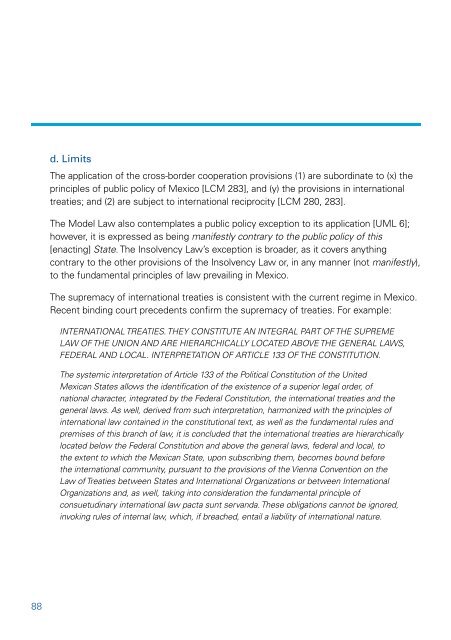Mexican Legal Framework of Business Insolvency - White & Case
Mexican Legal Framework of Business Insolvency - White & Case
Mexican Legal Framework of Business Insolvency - White & Case
Create successful ePaper yourself
Turn your PDF publications into a flip-book with our unique Google optimized e-Paper software.
88<br />
d. Limits<br />
The application <strong>of</strong> the cross-border cooperation provisions (1) are subordinate to (x) the<br />
principles <strong>of</strong> public policy <strong>of</strong> Mexico [LCM 283], and (y) the provisions in international<br />
treaties; and (2) are subject to international reciprocity [LCM 280, 283].<br />
The Model Law also contemplates a public policy exception to its application [UML 6];<br />
however, it is expressed as being manifestly contrary to the public policy <strong>of</strong> this<br />
[enacting] State. The <strong>Insolvency</strong> Law’s exception is broader, as it covers anything<br />
contrary to the other provisions <strong>of</strong> the <strong>Insolvency</strong> Law or, in any manner (not manifestly),<br />
to the fundamental principles <strong>of</strong> law prevailing in Mexico.<br />
The supremacy <strong>of</strong> international treaties is consistent with the current regime in Mexico.<br />
Recent binding court precedents confirm the supremacy <strong>of</strong> treaties. For example:<br />
INTERNATIONAL TREATIES. THEY CONSTITUTE AN INTEGRAL PART OF THE SUPREME<br />
LAW OF THE UNION AND ARE HIERARCHICALLY LOCATED ABOVE THE GENERAL LAWS,<br />
FEDERAL AND LOCAL. INTERPRETATION OF ARTICLE 133 OF THE CONSTITUTION.<br />
The systemic interpretation <strong>of</strong> Article 133 <strong>of</strong> the Political Constitution <strong>of</strong> the United<br />
<strong>Mexican</strong> States allows the identification <strong>of</strong> the existence <strong>of</strong> a superior legal order, <strong>of</strong><br />
national character, integrated by the Federal Constitution, the international treaties and the<br />
general laws. As well, derived from such interpretation, harmonized with the principles <strong>of</strong><br />
international law contained in the constitutional text, as well as the fundamental rules and<br />
premises <strong>of</strong> this branch <strong>of</strong> law, it is concluded that the international treaties are hierarchically<br />
located below the Federal Constitution and above the general laws, federal and local, to<br />
the extent to which the <strong>Mexican</strong> State, upon subscribing them, becomes bound before<br />
the international community, pursuant to the provisions <strong>of</strong> the Vienna Convention on the<br />
Law <strong>of</strong> Treaties between States and International Organizations or between International<br />
Organizations and, as well, taking into consideration the fundamental principle <strong>of</strong><br />
consuetudinary international law pacta sunt servanda. These obligations cannot be ignored,<br />
invoking rules <strong>of</strong> internal law, which, if breached, entail a liability <strong>of</strong> international nature.
















